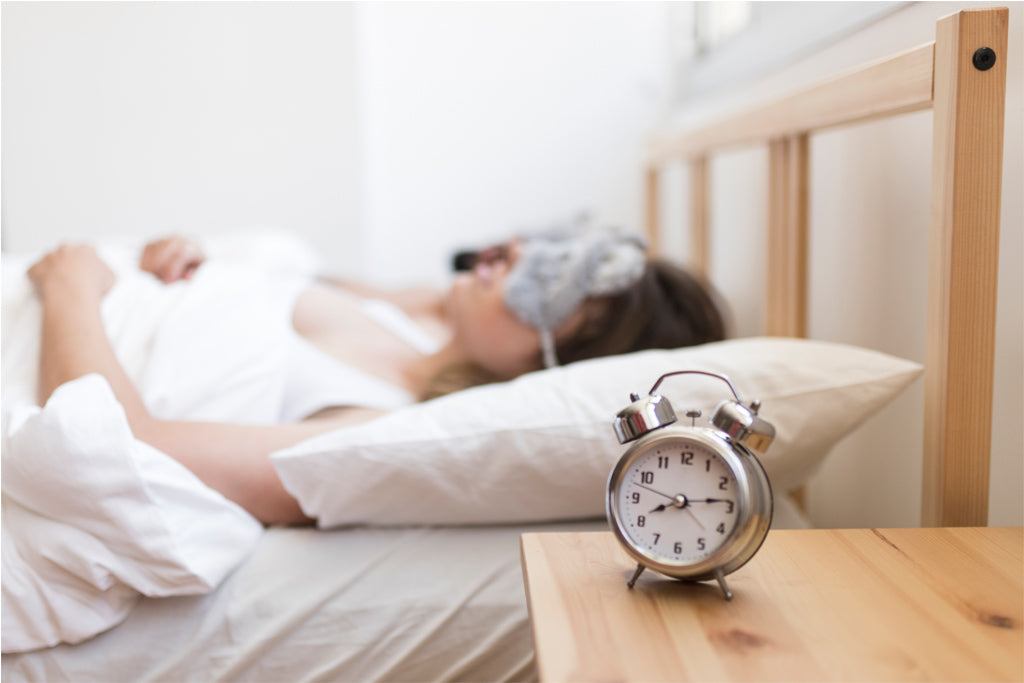Isn't it interesting how our sleep and wake cycle perfectly syncs with the sun and the moon? Just like the earth, the body has an internal clock that runs on a 24-hour cycle.
The reason why we feel sleepy and awake all comes down to the circadian rhythm. Sometimes referred to as the 'body clock,' a sound understanding of the circadian rhythm can help you transform your health, your sleep cycle, and allow you to wake up without hitting snooze.
While we all want to achieve perfect sleep to wake up without the drama of sleeping in, sleep plays a much bigger role than just giving us energy. Sleep is one of the most vital functions of your body.
Healthy sleep plays a significant role in boosting immunity, weight control, regulating blood sugar and cholesterol, and improving mental health. That’s why it's so important.
Learning about how the circadian rhythm works is one of the best ways to optimize health and well-being.
How The Circadian Rhythm Works

You can think of your circadian rhythm like a stopwatch, which indicates when an activity should start and stop. So far, we have covered that the circadian rhythm will trigger your body and mind to feel alert or sleepy.
When the cells in your body capture a change of brightness, it sends signals to let you know whether it’s time to be sleepy, or stay alert. Your body is constantly balancing melatonin and cortisol, hormones that induce sleepiness and alertness respectively. Light is one of the main ways it determines how to balance these hormones, but it also responds to other factors, such as body temperature, or lifestyle factors such as exercise and diet.
Check out Puffy mattress reviews from real customers and see how we compare with other brands.
Interestingly, the circadian rhythm doesn’t just work hard for your sleep cycle, but also for organs. The 'body clock' sends signals to vital organs when it's time for them to rest or kick into action. As a result, all the body functions are able to work together in a perfect schedule. The circadian rhythm contributes to successful digestion, cell regeneration, hormonal development, and much more.
So you get the point. It's essential - but how do you know how to protect it? It helps to know some of the common factors that can impact the circadian rhythm.
What Can Impact The Circadian Rhythm
There's a long list of things that can force the circadian rhythm to get confused. Many of these factors are unavoidable - there’s not much point debating the pros and cons of daylight savings, for example. It's good to be aware of them so you’re in a good position to make quick lifestyle adjustments to reverse the impact and get your body clock back on track.
Here are some of the most common factors that impact quality circadian rhythm cycles:
- Jet lag
- Working late at night
- Excessive stress
- Medication
- Binge drinking
- Inconsistent sleep routine
- Frequent travel
You can control some factors, such as binge drinking and sleep routine, but other causes need a little more consideration. For example, if you are taking certain medications that keep you awake, it may help to consult a doctor to find the best way to get your circadian rhythm back in sync with your lifestyle.
How to find your circadian rhythm
To uncover your true circadian rhythm, you need a week or two of free time. Ditch the alarm clock, and observe when you wake and feel sleepy naturally. Be responsive to your body’s instincts during this time - if you feel like winding down, be sure to get some shut-eye, and get out of bed as soon as you’re feeling awake. Use sleep trackers to record exactly what time this is taking place.
These timings will reveal to you the natural pattern of your circadian rhythm. If you’ve already worked out how to find your circadian rhythm, and want to hit the reset button, it can help to sleep in a bedroom that has no artificial light. For many people, the natural light of the sun is a natural way to wake up and feel more alert, while bedroom lights might actually prolong alertness too far into the night.
How the circadian rhythm changes with age
Your circadian rhythm changes go through a couple of different changes as you grow older. Here’s a brief overview of what takes place as you age:
Newborns
Newborn babies don’t actually have their circadian rhythms developed until they are a couple of months old. This is why new parents struggle so much with sleep - the sleep schedules of infants are unpredictable and erratic because their bodies have not learned how to adhere to an internal clock.
Toddlers
Around the three-month mark, babies begin to learn how to adapt to their environment and start to produce melatonin. From two to nine months, they also learn how to produce cortisol, another hormone that impacts the sleep cycle. By the time they’ve become toddlers, kids have a more mature circadian rhythm, requiring nine to ten hours of sleep for optimal rest.
Teenagers
The circadian rhythm gets disrupted once more when you’re a teenager when you experience something known as ‘sleep phase delay’. This is when teenagers begin feeling tired much later in the evening, while still requiring the same amount of rest they need as children.
Adults
Finally, most healthy adults can expect to see their circadian rhythms stabilize. As long as you’re consistent with when you go to sleep and when you wake up each morning, you can expect your body to go on auto-pilot and keep a healthy sleep schedule.
Common circadian rhythm disorders
If you’re finding it hard to keep your sleep cycle in check, you might be experiencing a circadian rhythm sleep-wake disorder (CRSWD). Experts have identified of the most common CRSWDs people experience:
- Delayed sleep-phase disorder: Delayed sleep disorder is very rare in adults, affecting only 1 or 2 in every 1,000 people. A key symptom is experiencing wakefulness through the night, and being unable to wake up in the early morning.
- Jet lag: One of the most common reasons your circadian rhythm might get interrupted is jet lag. This takes place when a person crosses time zones while travelling. Until you’re able to adjust to your new environment, you’re likely to experience fatigue and sleep deprivation while jetlagged.
- Shift work disorder: If work commitments require you to be up through the night and sleeping during the day, you’re likely to experience disruption to your circadian rhythm until your body adjusts.
- Advanced sleep-phase disorder: The opposite of what happens during delayed sleep phase disorder, this occurs when people begin to feel sleepy much earlier in the evening, and wake up very early in the morning. Affecting only 1% of the population, this disorder is relatively rare.
How To Get Back On Track

If you are convinced that your body clock is not working as well as it could, you can try these fixes tonight to get back on track again:
- Stick to the same sleep routine for at least two weeks: change takes time so allow your body to ease back into a sleep routine for at least 14 days.
- Ensure you're comfortable: falling asleep fast is essential when you want to adjust your body clock. You can fall asleep faster when you sleep on the best mattress.
- Limit naps: when you nap too close to bedtime, it confuses the body clock. As a rule, avoid napping after 3 pm, so you have a full 8 hours to get tired before bedtime.
- Workout in the morning: consistent exercise regulates hormone production and boosts well-being. When it comes to a morning vs night workout, be sure to avoid exercising too close to bedtime, since this can disrupt your rest.
- Sleep in complete darkness: similarly, night time tells the body that it’s time to sleep, therefore avoiding bright lights when it’s bedtime to prepare for deep rest.
A healthy sleep-wake will deliver holistic benefits for general well-being. Understanding how the sleep cycle and circadian rhythms function will allow you to customize your routine, so you’re always able to perform at your best.
Disclaimer. We love sleep and we want you to get the best sleep possible. But we do not provide medical advice. This blog is intended for informational purposes only. It is not a substitute for professional medical info, diagnosis, or treatment. Never ignore professional medical advice in seeking treatment because of something you have read on our blog.

- Award-Winning Comfort
- Lifetime Warranty
- 101-Night Sleep Trial
- Free Shipping in 1 - 2 Days
- Assembled in USA

Written by Monica Chinsami, Certified Sleep Science Coach
Monica is a writer who is passionate about the connection between wellness and sleep. She believes sleep has the power to unlock our greatest potential for health and happiness. Topics she's covered range from well-being, to the latest trends in sleep health and bedroom aesthetics. Monica holds a BA in Journalism from Monash University and is a Certified Sleep Science Coach.













